In Japanese, yo よ is a particle generally used to call for the listener's attention. It can be used in various ways: as a sentence-ending particle when alerting, correcting, asking, ordering, forbidding, or inviting the listener; as an interjection after someone or something's name to call for them, or mid-sentence to add an emphatic pause after a phrase.
- chigau yo!
違うよ!
[That's wrong]!
[You got the wrong idea]! - kiite yo!
聞いてよ!
Hear [me]! - ore wa yo, tsuyoi-n-da yo
俺はよ、強いんだよ
I (insert pause here) am strong. - kami yo, douka wareware wo o-sukui kudasai!
神よ、どうか我々をお救いください!
God, please save us!
Grammar
The yo よ particle can be used in various different ways: at sentence-end, mid-sentence, and after nouns (titles, or proper nouns, names)—however, it's normally only used at sentence-end. The other uses are common in fiction, for example, with characters speaking in unusual fashion.
Sentence-Ending Particle
The yo よ sentence-ending particle has several different usages, they are:
- Correcting people. Correcting statements, assumptions, misunderstandings, mistakes, etc.
- Alerting, warning or reminding people about something. Informing them of something they should know about.
- Clarifying doubts. Reassuring people. Assuring people something will happen or is so.
- Seeking sympathy, understanding, or consideration from people about something.
- Urging or daring someone to do something that they don't do, won't do, or don't want to do.
- Pointing out something that is wrong or makes no sense, including in questions and internal monologue.
Awkwardly, even though it FEELS like all usages of yo よ share some sort similarity, there doesn't seem to be a single, simple way to describe what yo よ does. Not even a single complex way to do it.
Considering this, I put a boatload of examples of usage below so we can have a proper idea of how it works. Before that, though, there are a few notions that remain the same regardless of how yo よ is used, so let's start with that.
The yo よ particle doesn't fundamentally change the meaning of the sentence(郡, 2018:14), as is the case with many sentence-ending particles. For example, if we compare:
Both sentences convey almost the same information.
The only difference is that yo よ would be used in a context such as, for example, where the listener picked the wrong thing—and then the speaker is correcting the listener: "it's not that one, pay attention! It's this one"—or where the listener hasn't picked anything, and they simply don't know what the thing is—and then the speaker is informing the listener of something they should know: "it's this one, see."
By contrast, assertions without yo よ (and without any other sentence-ending particle) merely state facts without seeking consideration from the listener.
Consequently, the same sentence can be said with or without yo よ without changing much, and you generally don't need to understand how yo よ works to understand what a sentence with yo よ means.
On the other hand, if you try speaking Japanese, not using yo よ at all may sound unnatural, while using yo よ all the time may sound obnoxious.
Finally, note that while yo よ generally doesn't change anything, it's still meaningful in conveying the speaker's feelings, and there could be cases where you have an ambiguous sentence that you'd interpret differently if yo よ were present.
Similarly, sometimes yo よ wouldn't make sense because its meaning doesn't fit with the rest of the sentence.(松岡, 2003:60)
Imposing Awareness
Many of the usages of the yo よ particle, in a very broad sense, share an idea of "imposing awareness," except we'd have various ways to impose, various types of awarenesses to impose, and various reasons to do it at all.
In summary: you need or want the listener to be aware of something, which you don't think they are sufficiently aware of, so you need to bring attention to that thing, to emphasize that thing, because it's probably important for you, or for them, or urgent, or something like that and you can't just stay quiet while they are insufficiently aware of it, because maybe you love them very much and you're worried about them not being aware, or maybe because you think they're a moron and you can't stand their lack of awareness, or maybe something in-between.
And the yo よ particle would be used in a case like that, which could be... lots of cases.
The examples of this below are separated into categories, but it's not really practical to categorize this stuff. Some may sound like they could fit a different category or maybe two categories simultaneously, pay no heed to it.
Correcting Statements
The yo よ can be used when correcting what someone said. When the listener says something obviously wrong, or appears to be mistaken about something, the speaker may feel that they must be corrected, and that's where yo よ comes in.
- tomato wa yasai da
トマトは野菜だ
Tomato is a vegetable.
- A statement perceived as incorrect.
- tomato wa yasai janai yo
トマトは野菜じゃないよ
Tomato isn't a vegetable.
- Beware: you're wrong.
- Where would you even get that idea from?
- Be careful from now on!
Without yo, the sentence would be merely stating a fact:
- tomato wa yasai janai
トマトは野菜じゃない
Tomato isn't a vegetable.
Both with and without yo よ are perfectly valid, so why would yo よ be used? Some possible scenarios:
- You're a teacher talking to a child, and because you care about them, you worry about them, you use yo よ.
- Your friend confidently stated incorrect information and appears to be proud of his mistaken knowledge, you worry that him not knowing better will get him killed someday, or worse: expelled, so you use yo よ.
- You're buying vegetables and some fool tries to make you buy his tomatoes, you have no patience for such shenanigans, so you use yo よ.
Since it's all the same yo よ, it's not possible to tell from one sentence alone, without context, whether the speaker cares for or despises whomever they're correcting.
Although, it's worth noting that the pitch accent of yo よ may differ across these two situations. When the speaker "awaits response," i.e. expects a nod of agreement, they care for them, it's a rising pitch, whereas one-sided alerts and corrections are unaccented.(郡, 2018:14–15)
- トマトは野菜じゃない↗よ
Be careful. - トマトは野菜じゃないよ
Be quiet.
In fiction, yoo~ よぉ~ (yo with a long vowel and trembling prolonged sound mark) typically, but not necessarily, represents ↗よ (yo with rising pitch). That might give you an idea of how it sounds like.
Note: pitch-accent notation isn't used in other examples in this article. No more arrows. Sorry.
In any case, if you hear someone saying it, they'll probably sound annoyed, so you won't really have to rely on pitch-accent information to tell which usage of yo よ they're intending to use.
By the way, boke ボケ and tsukkomi ツッコミ are comedy terms for scenarios where one character acts "stupid" and another can't stay quiet and has to "retort," respectively. Some of these "retorts" would include yo, but not every correction with yo is necessarily a tsukkomi.
Similarly, sometimes you have a tsukkomi that doesn't have a yo.
- Zura janai, Katsura da
ヅラじゃない、桂だ
[My name] isn't Zura, [it] is Katsura.- A catch phrase used by Katsura in Gintama 銀魂, who routinely gets called Zura (or dzura(see also: yotsugana 四つ仮名)). Both words mean "wig" in Japanese.
- Context: girl goes inside her brother's bedroom, but he doesn't want her there.
- ii daro betsu ni
ane na-n-da kara
いいだろ別に
姉なんだから
[It's alright, isn't it? Something like this doesn't matter.]
Because I'm your older sister.
- betsu ni - doesn't matter, whatever, either way is good.
- ii - fine, alright, okay, allowed, permissible.
- yokunee yo
よくねーよ
[No, it isn't!]- It isn't alright!
- kaere yo
帰れよ
[Go away!] ("Return!")- This is a different use of yo よ we'll see later.
- Context: anime.
- ...e
・・・え
...eh - nan-suka?
何スか?
- nandesuka?
何ですか?
What?
- nandesuka?
- soitsu φ {semete-kita} uchuujin ka nanka-suka?
そいつ攻めて来た宇宙人か何かスか?
[This guy] is an alien who came attack [us] or something?- ...ka ...ka
〇〇か〇〇か
X or Y. (an alien "or" something in this case.)
This is the ka か parallel marker.
- ...ka ...ka
- shitsurei na!
失礼な!
Impolite, [aren't you]?!- Rude!
- umare mo sodachi mo chikyuu desu yo
生まれも育ちも地球ですよ
[My place of] birth and rising is Earth.- In
west PhiladelphiaEarth, born and raised. - ...mo ...mo
〇〇も〇〇も
X and Y, too. X and even Y.
This is the mo も parallel marker.
- In
- Koro-sensei is offended for being called an "alien" and corrects the listener by saying he was born and raised on Earth: a genuine Earthling.
Correcting Assumptions
As one would expect, yo よ doesn't need to appear in a sentence that literally contradicts what the previous sentence said. It's also possible to correct the listener for appearing to be wrong about something, for holding an incorrect assumption, even if they haven't actually said anything wrong yet.
- Context: someone assumes you would do a certain thing.
- sonna koto shinai
そんなことしない
[I] won't do something like that.- Merely stating I'm not that sort of person.
- sonna koto shinai yo
そんなことしないよ
- You have got the wrong idea about me: I'm not that sort of person.
Note that since yo よ could be used even in a situation where the listener didn't say anything wrong yet, what we're seeing here is that:
- the speaker assumes that...
- the listener assumes something that...
- the speaker assumes is wrong.
That's a lot of assumptions going on here.
Inevitably, there could some joke in some series where a character corrects someone else based on a mistaken assumption of theirs, and this joke would be emphasized by the fact they used yo よ in their correction.
- ishi wa tabemono janai
石は食べ物じゃない
Stones aren't food.- Uh... yes? That's correct? Why are you even saying this.
- ishi wa tabemono janai yo
石は食べ物じゃないよ
- Are you implying I thought they were? Where would you even get that idea from?? Do I look like some wacko who eats stones for breakfast or something???
A crazier joke would be one where the character that corrects is actually wrong himself, and this moment of brilliance when he feels so confident in his worldview that he would go out of his way to correct others despite being so fundamentally wrong provides a glimpse into the machinations of his twisted mind and/or whatever dark, sad past he holds.
- nusumi wa hanzai janai yo
盗みは犯罪じゃないよ
Stealing isn't a crime.- Bruh...
- nusumi - noun form of nusumu 盗む, "to steal."
Of course, it's also possible there's no outright right or wrong in a scenario, and it's merely a different set of values that makes their common sense have nothing in common with the common sense of whomever they correct by stating what they believe is the obvious.
- Context: Kagura 神楽 gets hit by a scooter, prompting its passengers to assume they killed her, but it turns out she was totally fine.
- omae-ra baka desu ka?
お前ら馬鹿デスか?
Are you [guys] stupid? - watashi... {sukuutaa φ hanerareta} gurai ja shinanai yo
私・・・スクーターはねられた位じゃ死なないヨ
I wouldn't die just from {getting hit by a scooter}.- desu and yo are unusually spelled with katakana in Kagura's speech to represent her foreign accent.
- See: aesthetic spelling choices.
- Context: in this game, and many other Japanese games and isekai anime based on them, slimes are the weakest and most common monster you fight against. Pretty much every time you encounter a slime you're supposed to fight it, leading to the assumption that all slimes are evil. Exceptionally, there's a slime character in Dragon Quest 4 that you don't fight against, and you can talk with. Given the presupposition that the slime will be evil and you'll fight it, one of the first things the slime tells you is a clarification rejecting that presupposition:
- *"ijimenaide kure yo~.
boku wa warui suraimu janai yo.
*「いじめないでくれよー。
ボクは わるいスライムじゃないよ。
pls no bully,
I'm not a bad slime.- ijimeru いじめる
To pick on. To bully. To be cruel to.
- ijimeru いじめる
- Menu:
- komando コマンド
Command. - hanasu, jumon
話す, 呪文
Talk, spell (cast heal, etc.). - tsuyosa dougu
強さ, 道具
Strength (stats), tools (items). - soubi, sakusen
装備, 作戦
Equipment, strategy (reorder party members). - tobira, shiraberu
扉, 調べる
Door (opens a door adjacent to you), investigate (opens chests under you for some reason).- And yes, you actually got THREE different commands—talk, door, investigate—to do stuff where a normal RPG would have only one command that does any of the three depending on what is in front of you.
- The brief window on the bottom right is the name of the characters, their HP and MP.
- Minea ミネア
- Maanya マーニャ
Correcting Ignorance
Besides correcting people who are explicitly wrong, and people whom you assume are wrong, yo よ is also used when you need to correct someone's lack of knowledge about some important fact.
In this case, rather than the speaker thinking the listener has the wrong idea about something, it would be them thinking the listener has NO idea about something, and they must be made aware of the cold truths of the universe.
Again with the assumptions: the flip side of the coin is that you could have a joke where a character's use of yo よ implies they think another character doesn't know something despite the fact being they do know it. This could play out in various ways:
- An aloof character who lacks common sense just learned a new piece of information which is obvious for everyone else (e.g. a sheltered rich girl learns how to pay in cash), and then they try to teach it to others assuming few people know about it just because they didn't know about it.
- An average person warns a super genius elite expert of 500 IQ in some field that they're about to make a rookie mistake, completely unaware that it's all part of their keikaku.
- Note: keikaku 計画 means "plan."
- After spending a whole episode having to deal with something, characters end up in situation where they have to listen to someone spouting sermons of things they're sick and tired of being aware of.
- A nice guy tries to persuade an evil character to stahp, insisting that doing evil is evil, so he should stahp. The evil character, fully capable of self-introspection and long aware of his evil ways, does not stahp.
These are all scenarios where awareness is imposed onto someone who doesn't need it. English doesn't have a yo よ, and you certainly wouldn't need a yo よ to get the joke, but, regardless, in Japanese yo よ is likely to be used as it conveys the speaker isn't merely stating facts, but also concerned with their assumed lack of awareness of the listener,.making the whole situation extra awkward.
- Context: Rudeus Greyrat ルーデウス・グレイラット speaks the absolute truth of the universe.
- kane de "dere" wa kaenai-n-desu yo!!!
金で「デレ」は買えないんですよ!!!
Money can't buy "dere"!!!
[You] can't buy "dere" with money!!! (literally.)- 「」 - quotation marks.
- kaenai - negative form of kaeru 買える, potential verb from kau 買う, "to buy."
- Context: Two-Hands succinctly elaborates her argument against the notion of which the appearance and/or background history pertaining to a firearm is of any importance.
- hitotsu ii koto oseete yaru yo.
一ついいことおせえてやるよ。
[I'll] teach one good thing. - konna mon wa na,
こんなもんはな、
This sorta thing, [you see],- The furigana dots are for emphasis.
- konna mono こんなもの
This sort of thing.
- utete atarya ii-n-da yo.
撃てて当たりゃいいんだよ。
[If you] shoot and [it] hits, [that's enough].
- atarya - contraction.
- utete atareba ii
撃てて当てればいい
Good if shoot and hit.
Warning
One specific way to correct ignorance or assumptions, informing people of stuff they should know about, is to warn them about something that's probably going to happen and that they don't seem sufficiently aware about.
- abunai yo
危ないよ
It's dangerous. - hayaku tabenai to chikoku suru yo
早く食べないと遅刻するよ
If [you] don't eat quickly [you] will be late.
- Context: Zen'itsu 善逸 warns everyone about something he thinks is going to happen that other people may not be properly considering.
- tabun sugu shinimasu yo, ore wa
多分すぐ死にますよ俺は
- ore wa tabun sugu shinimasu yo
俺は多分すぐ死にます死にますよ
I'll probably die immediately.
- ore wa tabun sugu shinimasu yo
- Context: Gojou Wakana 五条新菜 looks up on the internet the price of a camera.
- kyuu-juu san man kyuu-sen roppyaku en (zei-komi)
939600円(税込)
Nine hundred thousand six hundred yen (with tax).- It's over 8000 dollars!
- zei-komi 税込み, "tax included," was spelled here between parentheses without okurigana.
- re, renzu betsu-uri...!?
レ レンズ別売り・・・!?
Lens sold separately...!? - {renzu igai mo soroeru} to motto suru wa yo
レンズ以外も揃えるともっとするわよ
{Plus other things besides the lens} [it] goes for even more.- It costs even more.
- soroeru - "to join in order to complete a set," in this case "adding" the other pieces of equipment makes it way more expensive.
- suru する - to go for a price in this context.
- refu-ban, {moderu ni hikari wo hansha sasete} akaruku dekiru
レフ板 モデルに光を反射させて明るくできる
Reflector board: {by making light reflect on the model} [it] can make [the photo] brighter. - sutorobo, soto-dzuke furasshu
ストロボ 外付けフラッシュ
Strobe: external flash. - sankyaku, te-bure ga fusegeru, hitori taku-kosu de benri
三脚 手ブレがふせげる 一人宅コスで便利
Tripod: can stop trembling of hand, useful when cosplaying at home alone.- fusageru - potential of fusegu 防ぐ, "to block," "to prevent."
- nado nado
などなど
Et cetera et cetera.
Advice
Similarly, yo よ is also found when giving advice to people, specially when telling that they should do something as they seem unaware that doing such thing would be a good idea.
- Context: someone doesn't know the girl's name.
- ano ne~~'
あのネ~~っ
[Hey, look~~] - {kurasu no ko no namae kurai oboetoita} hou ga ii yo
クラスの娘の名前位覚えといた方がいいヨ
It's better if {[you] learned the names of the girls of [your] class at least}.- oboetoita - contraction of oboete-oita 覚えておいた, past form of a ~te-oku ~ておく phrase.
- toku ni kawaii ko wa!
特にカワイイ娘は!
Specially the cute girls!
Reassurances
In some cases, sorting out confusions means reassuring the listener that something will happen when they appear in doubt about something, or appear hesitant.
- Context: someone gets in their hands a food they don't seem to know how to eat.
- sono mama taberareru yo
そのまま食べられるよ
[You] can eat [it] that way.- sono mama - the way it is right now, i.e. it doesn't need to be prepared, processed, cooked, etc., you can eat it as-is.
- Context: just any anxious situation.
- kitto daijoubu yo
きっと大丈夫よ
[I] am sure [it] will be alright.
- naremasu yo
慣れますよ
[You] get used to [it].- nareru - to grow accustomed to, to get used to.
Confirming Awareness of Irrefutable Assertions
Some uses of yo よ can be understood as the speaker seeking the listener to confirm they became aware of something. This is complicated because in practice it doesn't look like this is happening at all, but this is the only way to explain what's happening technically. To have a better idea, when we say:
- It's a fruit, you see.
- I'm going to become a doctor, you see.
- Her illness can't be treated, you see.
What's the purpose of "you see" in the English sentences above? Similarly, but more explicitly:
- You know?
- You understand?
- Got it?
- Capisce? (Italian for "understand," sometimes used in the U.S.)
Despite all such phrases in their literal meaning having the function of asking the listener if they understand whatever was explained to them, in practice when someone says these they rarely expect a response at all.
You assert an explanation, and you're so confident in what you're saying that the idea the other party disagrees with you is not in your mind.
Rather, you're imposing your knowledge, and what you're asking for is merely a nod in agreement confirming that they heard it right and don't have any doubts that naturally you can answer, or, perhaps, that they think about it for a while and come to the same conclusion as you have because what you say makes perfect sense.
Thus some of its functions, there are others but these are the ones relevant about yo よ, would be:
- Seeking acknowledgement.
- Yes, I heard it right.
- Seeking consideration.
- It does seems like it is the way you say.
- Seeking understanding.
- I comprehend why you think the way you do.
- Seeking sympathy.
- I comprehend why you feel the way you do.
It's not strange that sometimes it seems yo よ translates to "you see" in English, as their functions overlap partially.
For reference, this is what a technical explanation of "you see" in sentence-final position would sound like:(Mao, 2021:32–33, abbreviations replaced: CG=common ground, A=addressee=listener, S=speaker, p=proposition=idea.)
[...] the primary purpose of you see in this position is to update [common ground] by seeking a confirmation concerning whether a belief assumed to be shared is accepted by [the listener]. In the example of (18), [the speaker] provides [the listener] with a justification regarding the behaviour of not bringing gloves. Similar to sentence-initial you see, with final you see, [the speaker] establishes [common ground] by assuming the hearer would understand his reason. Thus, final you see initiates a request to confirm that [the listener]’s belief towards [an idea] is identical to [the speaker]’s attitudes towards [that idea].
Much of the above can be said about yo よ: it's used when informing and ensuring the listener knows the same stuff you already know about, and it sounds like it seeks some sort of confirmation, when, in fact, the speaker already ASSUMES the listener would agree before using the phrase.
Why would the speaker assume this so confidently? Typically, it's because they have some sort of exclusive access to some information, so it's unthinkable for the listener to disagree when they can't be more informed in the subject than the speaker. The main cases would be:
- The speaker is a teacher or expert in a field, while the listener is not. Since the speaker is only teaching something BECAUSE the listener doesn't know it, it's unlikely they would be able to refute whatever the speaker said, even if the speaker were to make a mistake.
- The speaker is giving their personal view about something, telling a personal story, personal plans, telling how they feel about something. Since the speaker can't get inside of the speaker's head to tell whether they're lying, it's improbable for them to assert that's not how the speaker really feels.
The listener is in no position to disagree, they must take it at face value. Thus the use of "you see" or yo よ is a mere formality (wait, that's a confusing word to use) a mere gesture to communicate you respect the listener's opinion on the matter, even though their opinion may only be a nod in agreement.
With this in mind, let's see some examples of this in practice.
Teaching
The yo よ particle can be used when teaching something to a listener that requires help learning about that thing. In this case, yo よ works like "you see" in that it expects the listener to consider the explanation taught.
As always, you don't need yo よ to teach or to explain stuff, the same way as you don't need "you see" in English.
- Context: teaching someone how to use a computer.
- kore wa?
これは?
This thing [is]? - mausu. {sore wo tsukatte}
sousa suru no yo
マウス それを使って操作するのよ
Mouse. {Using that thing} [you] operate [the computer].
- Context: Joseph Joestar ジョセフ・ジョースター reveals to Smokey スモーキー what his last resort strategy entails and what he should do.
- nigeru-n-da yoo! Sumookii~~'!!
逃げるんだよォ!スモーキーーーッ!!
Run away!! Smokey!! - doke~' yaji-uma-domo~'!!
どけーッヤジ馬どもーッ!!
Out of my way! Onlookers!- yaji-uma - onlooker, someone who is watching a scene they have nothing to do with.
- ~domo ~共 - disrespectful pluralizing suffix.
- waa~'!!
わあ~ッ!!
Wah!! - nanda kono otoko~'
なんだこの男ーッ
What's up with this guy!
Expert Assertions
The yo よ particle can be used by an expert or someone with privileged access to some information to teach something to someone who lacks the expertise or privilege to know about it, and therefore can't possibly refute it. In this case, yo よ works like "you see" in that it expects the listener to consider the information taught.
- Context: in a series about people that have powers called quirks, a doctor examines Midoriya Izuku 緑谷出久, talks about how quirkless people have two joints in his pinky toe, and then says:
- Izuku-kun niwa kansetsu ga futatsu aru
出久くんには関節が2つある
Izuku-kun has two joints.
- The dots in the furigana area are for emphasis.
- {kono sedai ja mezurashii...} {nan'no "kosei" mo yadottenai} kata da yo
この世代じゃ珍しい・・・何の“個性”も宿ってない型だよ
A type {rare in this age}, [that] {doesn't [contain] any quirk}.- yadoru
宿る
To dwell. (in this case, for a quirk to dwell in his body, i.e. for a quirk to be contained in him, for him to contain a quirk.)
- yadoru
Permitting and Forbidding
The yo よ particle is sometimes used to tell the listener that something is permitted or that it's forbidden. This happens in two distinct scenarios:
- Whether something is allowed or not is common sense, but the listener appears to be unaware of the rules, so the speaker merely alerts them about it.
- The speaker has the authority to allow or forbid things, which, taken to its extremely unfair authoritarian form, would mean that only the speaker knows what they would allow and what they would not, making this information privileged information.
In the latter case, yo よ works like "you see" in that it expects the listener to consider the information taught, but since they would be under the speaker's authority they can't possibly refute it.
By the way, the phrase ~te-ii ~ていい (te-form of a verb preceded by ii いい, "good") is typically used to say something is allowed, okay/fine to do, while ~te-wa dame ~てはだめ, among other similar phrases, would be used to say it's not allowed, not okay to do.
- Context: Honda Hanako 本田華子 asks the student council president to listen to her objection about why the shōgi 将棋 club shouldn't get to use the classroom that they've been occupying to play games and fool around.
- shougi, also romanized shōgi, is a board game.
- hai douzo
はいどうぞ
Okay, [say it].- douzo - used to say someone is free to do something.
- shoogi tte {oshiri kara biimu φ dasu} ano kyougi da shi, {kyoushitsu de yaru} niwa kiken janai desu ka!?
ショーギってお尻からビーム出すあの競技だし 教室でやるには危険じゃないですか!?
Shogi is that game [where] {[you] fire a beam from [your] butt}, so [it] would be dangerous {to do [it] in a classroom}, wouldn't [it]? - *everybody stares confused*
- Hanako, mou yasunde-ii yo
華子 もう休んでいいよ
Hanako, [you] can rest already. (because you're so tired you're talking nonsense.) - are? nani-ka machigaechatta?
あれ?何か間違えちゃった?
Huh? Did [I] [say] something wrong?- ~chatta - contraction of ~te-shimatta ~てしまった.
- Hanako-san no atama no naka niwa sonna kyougi ga aru no?
華子さんの頭の中にはそんな競技があるの?
Inside [her] head, a game like that exists?
Personal Explanations
The yo よ particle can be used when explaining something about yourself, and since it's something only you would know about, it's irrefutable. In this case, yo よ works like "you see" in that it expects the listener to consider the explanation taught.
- Context: who are you?
- Anime: Shokei Shoujo no Virgin Road, 処刑少女の生きる道.
- kiyoku tadashiku, soshite tsuyoi shinkan da yo
清く正しく、そして強い神官だよ
A pure, just, and strong priestess.
Personal Plans
The yo よ particle can be used to inform the listener of something that you decided to do, that you plan to do, etc. In this case, yo よ works like "you see" in that it expects the listener to consider the information taught, but since they can't possibly refute your personal plans, they can only nod about it..
Personal Emotions
The yo よ particle can be used to inform the listener of how you feel. In this case, yo よ works like "you see" in that it expects the listener to consider the information taught, but they can't refute your emotions, so you they can only nod and perhaps sympathize with it, or have some pity.
- Context: Gokuraku Nozomi 獄楽希, a monster girl that looks like a boy, checks a fashion magazine that seems to feature one of her friends in the cover.
- isso anta mo moderu φ mezashite-mitara
いっそアンタもモデル目指してみたら
How about [you] try to become a model, too?
- ~te-mitara - ~tara ~たら form of ~te-miru ~てみる, "to try to."
- ore ga?
俺が?
Me? - juyou aru to omou yo
需要あると思うよ
[I] think there's demand.- For a model that looks like a boy.
- tsuttemo ore fashon toka shiran shi
つっても俺ファションとか知らんし
[Even if you say that], I don't know [anything about] fashion.- tsuttemo - contraction of to-itte mo と言っても.
- Context: a slug panics over a deadly salt-sprinkling old man.
- yamete yo~'
やめてよーっ
Stop~! - shinitakunai yo~'!!
死にたくないよーっ!!
[I] don't want to die! - See also: plewds.
- yoshi na...
よしな・・・
Stop [it]...- yoshi - ren'youkei 連用形 of yosu 止す, "to stop." Normally you see this in the meireikei 命令形, e.g. yose yo よせよ, "stop [it]."
- Context: things you get used to.
- uee...
うぇぇ・・・
Eeeeugh... - kusai...
臭い・・・
[It] stinks... - kimochi warui yoo...
気持ち悪いよぉ・・・
[This is] gross...
Alerting About Newly Noticed Issues
The yo よ particle can be used to alert the listener of an issue that you have only realized yourself immediately before pointing it out. This can occur in two distinct scenarios:
- You noticed something the listener hasn't noticed yet, i.e. you have exclusive information that you're about to share with them.
- You noticed something the listener already knew about, but the listener doesn't consider the thing to be an issue, i.e. you are correcting their perception of the matter instead.
In either case, yo よ vaguely works like "you see" in that it expects the listener to consider the information taught, to consider the issue, naturally in order to do something about it, to address the issue and fix it.
- Context: you check the work someone else did.
- a! kore φ machigatteru yo
あ!これ間違ってるよ
Ah! This is wrong!
- You made a mistake here, see.
- machigatteru - contraction of machigatte-iru.
- Action expected: fix the mistake.
- Context: Mishima Hitomi 三嶋瞳 finds Hina ヒナ asleep and drooling.
- n
ん
Hmm. - yodare tareteru yo
よだれたれてるよ
"Drool is dripping." (literally.)
[You are] drooling.
- tareteru - contraction of tarete-iru 垂れている.
- goshi'
ゴシッ
*scrubbing clean* - n
ん
Hmm. - aa, seifuku de shicha
ああ 制服でしちゃ
Aah, [don't do it] using [your] uniform.- __ shicha dame
〇〇しちゃ駄目
Doing __ is bad.
You shouldn't do __.
Don't do __.
- __ shicha dame
- Context: two guys are looking for a dangerous stalker.
- aa
ああ
Aah. - daijoubu da yo kanojo wa
大丈夫だよ 彼女は
- kanojo wa daijoubu da yo
彼女は大丈夫だよ
She's alright. (in other words, it's not her.)
- kanojo wa daijoubu da yo
- iya iya
いやいや
No, no. - dou mite mo me ga yabai yo
どう見ても目がヤバイよ
No matter how [you] look at [it], [her] eyes are dangerous!
- Context: in order to repay a monetary debt, Fujioka Haruhi 藤岡ハルヒ has to pretend to be a boy at a high school host club, and to play the part she uses the masculine first person pronoun ore 俺. Hearing her say this, the club president, Suou Tamaki 須王環, who instantly started acting like he's her father, says:
- {onna no} ko ga "ore" nante ikemasen!!
女の子が「俺」なんていけません!!
Girls shouldn't [say] "ore!"- ikemasen - literally "can't go," translates as "shouldn't."
- okaasan!!! Haruhi ga {kitanai} kotoba wo tsukau you~~!!!
おかーさん!!!ハルヒが汚い言葉を使うよウーー!!!
Mother!!! Haruhi is using {dirty} words!!!- In Japanese, it's common for words that mean "mother," like okaasan お母さん, to be used to refer to one's wife, i.e. Tamaki is referring to his daughter's mother, not to his own mother.
- okaasan? dare?
お母さん?誰?
Mother? Who [is it]? - ore ka ne... nantonaku
俺かね・・・なんとなく
Me, [I think]...- nantonaku - it just feels like it's so, used when you feel something is true for some reason or another, but you can't say exactly why you feel like that.
- Although, in this case, it would be because Ootori Kyouya 鳳鏡夜 is the vice-president of the club.
- Context: Hokuto Takeshi 北斗武士 changed schools and heard there's someone strong in his class, when he tries to enter, he's blocked by a gorilla.
- ......
- pisha...
ピシャ・・・
*sound effect for door closing* - ningen janee~~!!
人間じゃねえ~~!!
[He's] not human~~!! - moshimoshi mama~~!? kyoushitsu ni hairenai yo, papa ni kawatte~~~~!
もしもしママ~~!?教室に入れないよ パパに代わって~~!!
Hello, mom~~? [I] can't enter the classroom, [put] dad [on the phone]~~!
- kawaru
代わる
To switch. (in this case, to switch who's talking on the phone.)
- kawaru
Questions
The yo よ sentence-ending particle is used in questions and expressions of uncertainty in various different ways.
Seeking Confirmation
The yo よ particle, when coming before ne ね or na な, forming yo ne よね, yo na よな, can be part of a question used to seek confirmation or agreement that what you're saying is true, like:
- kore da yo ne?
これだよね?
[It] is this one, [isn't it]? - kore da yo na
これだよな
[It] is this one, [I think].
What both sentences above share is that while the speaker asserts something to be true ("it's this one"), the speaker is unsure of whether that's actually the case. They feel like it is, but they may be wrong.
Note that yo よ by itself can't be used to ask questions in this manner. It must come before ne ね or na na な. Which means that it's ne ね and na な adding the doubt to the equation, and the function of yo よ must be something else.
- kore da yo?
これだよ?
*It's this one, isn't it?(can't be used like this.)
*It's this one, I think?(can't be used like this.)
Huh? It's this. Why are you asking? (can be used like this.)- If it's written with an interrogation mark after yo よ, it's because the tone of the character's voice is of a question, but this doesn't change the function of yo よ: they're still asserting something they have confidence in being true, only that now they would be wondering why are you making them say this at all.
One possible explanation, considering the other uses of yo よ, is that yo よ is used because the speaker FEELS that "it's this." It's their personal belief that the assertion is correct.
While the assertion can be refuted, they can be wrong, the fact that they currently believe it to be true can't be refuted. In "I think it's this," you can prove the part "it's this" is wrong, but you can't prove I lied when I said I was thinking that, so the "I think" part is irrefutable, even if "it's this" is refutable.
Thus the speaker is imposing awareness of what they think to be true, and their thoughts can't be refuted, while at the same time they concede they aren't certain about it and may seek confirmation of whether or not they are right.
It's also possible that one of the multiple uses of yo よ gets combined with one of he multiple uses of na な or ne ね when you have a sentence with yo na よな or yo ne よね.
- na... nanda kore
な・・・なんだこれ
Wh... what's this.
(emotive right-dislocation) - sugee na...
スゲーな・・・
It's amazing...- sugee スゲー is sugoi 凄い with relaxed pronunciation.
- tenbyou de haikei toka kaichatteru jan
点描で背景とか描いちゃってるじゃん
The backgrounds [and other stuff] are drawn using stippling. - shunkan ja ikura Nakai-san demo konna kaki-kata muri daro......
週刊じゃいくら中井さんでもこんな書き方無理だろ・・・・・・
In a weekly serialization, even Nakai-san [won't be able to use] this way of drawing......- muri
無理
Impossible.
Unreasonable. Unmanageable. That can't be done or that won't work. - The character is saying that, despite Nakai's abilities, it'd be impossible to draw using stippling in a weekly serialization, since he would have to render dozens of pages every week using this technique and there just isn't enough time.
- muri
- suggoi kirei na e da yo ne
すっごいキレイな絵だよね
The drawing is extremely pretty, isn't it.
- aitsu zettai "chuunibyou" da yo na~~
アイツ絶対「中二病」だよな~
He's definitely chuunibyou, [I'm sure.] - kou-ni nimo natte, mattaku
高二にもなって 全く・・・
[Even] after becoming a high school second year [student], [good grief]...
How "seeking confirmation" works depends on whether the particle is ne ね or na な, and this would be how these particles work in general regardless of whether yo よ comes before them.
With ne ね: you're asking someone else for their opinion, for them to confirm it. Isn't it? Aren't you? Isn't that right? Won't he? And so on.
With na な: you're expressing you think that's how things are. This one is less likely to be used to confirm things with someone else because ne ね is more explicit in that. Instead, it's closer to "I feel like that could be true but I could be wrong." I could have misheard it, misunderstood it, etc.
It can still be interpreted as an "isn't it" question seeking confirmation. Observe:
- Context: talking about whether doing something will end badly.
- yatte-minai to wakaranai yo
やってみないとわからないよ
[You] wouldn't know [for certain] unless [you] tried.- You have to "to do [it] to see" if it works, yatte-miru やってみる (yaru やる plus ~te-miru ~てみる).
- With yo ne instead:
Don't you agree? - With yo na instead:
I think that's how it works, which prompts the refutation "that isn't how it works," which means yo na may also be interpreted as: isn't that how it works?
Both na な and ne ね can be used in self-speech, and consequently yo na よな and yo ne よね as well.
The effect is basically the same: with ne ね you're directly asking yourself a question, like looking at the mirror and saying "wow, I'm such an idiot, am not I?" Meanwhile with na な it's closer to "that's how things are, aren't they," or a simpler "huh."
- hanarero yo oi!!
離れろよオイ!!
Let go of [me], hey!! - Mikoto tte yonde yoo~~
命って呼んでよぉ~
Call me Mikoto~~ - atashi tsuyoi otoko suki nanda yo ne~~♡
アタシ強い男好きなんだよね~~♡
I like strong men~~♡ - chou do-emu dashii~~
超ドMだしィ~~
[I] am a ultra, super masochist~~ - shiranee yo! ii kara hanarero!!
知らねーよ!いいから離れろ!!
[I don't care!] [Just] let go of [me]!!
- Context: vikings viking around.
- {hajime wa are datta} kedo Ingurando (kocchi) no biiru nimo chikagoro narete-kita yo na
はじめはアレだったけどイングランドのビールにもにも近頃なれてきたよな
{At first [it] was "that"} but lately [I feel like] [I] have gotten used to England's beer.- i.e. at first the beer felt weird, but lately he's gotten used to it.
- kocchi こっち, "this side," is used as gikun 義訓 for England in this panel because the vikings aren't from around England, i.e. their country is "over there," acchi あっち, and to "this direction," "this side," "around here," kocchi こっち, is England.
- a! ii na, ore nimo hitokuchi
あ!いいな オレにもひとくち
Ah! [That] is nice. Give a sip to me, too.
Emotionally-Charged Questions
The yo よ particle is used with different types of questions that carry some sort of emotion in them. They appear to be related somehow despite being used in totally different scenarios, and one way to translate yo よ in some cases could be use of expletives. We can categorize them like this:
- To express surprise at something that came out of nowhere.
- dare da?
だれだ?
Who is [it]?
Who is [him]?
Who are [you]? - dare da yo?
だれだよ?
Who the hell are [you]?!
Who the hell is [this guy]?!
- dare da?
- To express incredulity when learning something.
- omae ka yo?
お前かよ?
[It] was you?! - maji ka yo?
マジかよ?
Are you for real?!
- omae ka yo?
- To express indignation and powerlessness.
- Context: something terrible happened to you, leaving you devastated.
- kore kara dou yatte ikireba ii-n-da yo?
これからどうやって生きればいいんだよ?
How am I supposed to live from [now on]?!
Generally speaking, none of these "questions" serve a purpose of seeking an answer, but instead they express something about the speaker.
For example, it can voice the speaker's own lack of answers. The illocutionary act of asking "how am I supposed to live like this?" is to express "I have no idea how I'm supposed to live like this."
Similarly, by expressing incredulity one would say "I can't believe that it was you" or "I can't believe that you're being serious right now," often because this fact caught them by surprise.
In fact, it isn't true that this usage is limited to indignation and powerlessness, but that lacking answers typically occurs when you're powerless, and voicing this occurs when you're frustrated. It's also possible to have a scenario like this:
- Context: you offer a solution to a problem, but the listener says that's a bad idea, so you tell them:
- jaa dou sureba ii-n-da yo?
じゃあどうすればいいんだよ?
Then what are [we] supposed to do?!- Since apparently you have a much better solution than mine, well, let's hear it then, huh.
In this case, you're urging the listener to answer the question, because it's important. Generally, however, it won't be something important, but something sudden that will trigger the question.
Do note that whether it's surprising, shocking, amazing, frustrating, vexing, etc., all questions with yo よ feature some emotion or another, because they all must be either important and in need of urgency or sudden and equally in need of urgency.
In some cases, the yo よ particle is similar to the i い particle, which works like a gentler version often used to jokingly retort stuff.
Just as you have ~ka yo ~かよ and ~da yo ~だよ you have ~ka i ~かい and ~da i だい, although I guess everyone would romanize these as ~kai and ~dai because ~i ~い it barely looks like a standalone particle. For example:
- omae kai
お前かい
It was you.- Haha, it was you?
- {yatta} no wa dare dai
やったのは誰だい
Who was the one [who] {did [it]}?
- nan'nanda yo sono kao!!
何なんだよその顔!!
What's up with that face!! (emotive right-dislocation) - yamero--------'!!
やめろーーーーっ!
Stop!! - nande sonna {{betsu no ikimono miru} you na} me de ore wo mite-n-da
何でそんな別の生き物見るような目で俺を見てんだ
Why are [you] looking at me with such eyes [that] {look like {[they] see a different species}}.
Why are you looking at me as if I'm a different creature. As if I'm not a human being like you.
A monologue example:
Requests
The yo よ sentence-ending particle is sometimes used when telling people to do stuff. In this case, the speaker would be urging or pleading them to do something important or daring, goading them into doing it.
This may occur with all sorts of imperative forms, including the meireikei 命令形, the te-form, the nasai なさい form, and so on. It also works with other hortative expressions, such as the volitional form.
- yare
やれ
Do [it]. - yare yo
やれよ
[Come on], do it.
- sassato yare yo
さっさとやれよ
Do it already!
- sassato yare yo
- yamemashou yo
やめましょうよ
Let's stop, [okay]? - mate yo
待てよ
Wait.
As you can imagine, this yo よ can translate to all sorts of different things in English, and there will be cases where it's not really translatable at all.
The basic idea is that you have a command to give, and the listener may hesitate or disregard your command, so yo よ is thrown on top to call for their attention.
Generally this call for attention is understood as urging, pleading, begging, asking, and so on, because it's a situation where the speaker needs the listener to stop and listen to what they're saying.
However, there are also cases where this call for attention is instead daring someone to do something, provoking, goading them into doing it.
In English, too, the phrase "come on" can be used in both cases. Come on, let's stop already, that's enough. Come on, do it, let's see if you have the guts. But translating yo よ to "come on" every time might end up sounding terribly weird.
- miro yo
見ろよ
Look! - koko ni chi no ato mitai ni tenten to......
ここに血のアトみたいに点々と・・・・・・
In here, [something that] looks like blood marks [is stuck] in drops.- ato
跡
Something left behind by something else, usually as evidence.
Tracks, traces, marks, scars, etc. - tenten to
点々と
Scattered around as drops, dots, points.
- ato
- Context: Edward Elric エドワード・エルリック wants to show who's boss.
- orite-koi yo, do-sanryuu
降りて来いよ ド三流
Come down, third rate. - {kaku no chigai tte} yatsu wo misete-yaru!!
格の違いってやつを見せてやる
[I] will show [you] what {is called difference of ranks}. (literally.)- In the sense of the difference between a third rate alchemist and a first rate one.
- Context: a childhood friend of Tadano 只野 wants to be called on first-name basis, without a honorific suffix.
- sono "Osana-san" tte iu no
yamete-kure yo.
その「長名さん」っていうのやめてくれよ。
Please stop with that "Osana-san."- Stop calling me "Osana-san"
- boku to Tadano-kun no naka janai ka.
ボクと只野くんの仲じゃないか。
It's mine and Tadano's relationship, isn't it?- It's our relationship, isn't it?
- Osana-san means they don't have a cold, distant, family-name basis relationship, they have an intimate, friendly, first-name basis relationship.
- pyoko-pyoko
ピョコピョコ
*[hair] bounce bounce* (mimetic word.) - mukashi mitai ni
"Najimi" tte
yonde kure.
昔みたいに「なじみ」って呼んでくれ。
Like old times, call me "Najimi."
- Context: a young boy asks a squid girl for help with his studies.
- jaa Ika-neechan, boku ni sansuu oshiete yo!
じゃあイカ姉ちゃん ボクに算数教えてよ!
Then, Ika-neechan, teach me arithmetic!- neechan - older sister, may also be used toward young women whom one's not related to, specially used by children toward any girl older than them.
- Symbology: laughter lines, realization mark.
- betsu ni ii degeso yo
別にいいでゲソよ
[I don't mind doing it].
- Context: Saiki borrows his father's glasses without permission.
- oi~~ megane kaeshite yo~~
オイ~~眼鏡返してよ~
Heey, give [my] glasses back~~ - gaman shite kure chotto me ga "san" ni naru dake daro
我慢してくれちょっと目が「3」になるだけだろ
Please endure [it], [all that will happen is that] [your] eyes will become "threes."- In anime, eyes are drawn like 3's sometimes when a character that needs glasses isn't wearing them.
- megane ga nai to hotondo mienai-n-da yo~~
眼鏡がないとほとんど見えないんだよ~
Without [my] glasses [I] almost can't see. - yon!?
4!?
Fours!?
- Context: Hijikata invites someone to a restaurant, to talk about something.
- maa maa
まぁまぁ
For starters.- Used when offering someone something before talking, etc.
- enryo sezu ni tabenasai yo
遠慮せずに食べなさいよ
Eat without reservation.- i.e. don't mind me, just go ahead and eat.
- Context: Vignette learns the harsh realities of doing group projects.
- anta-ra ii-kagen ni shinasai yo'!!
アンタらいい加減にしなさいよっ!!
You [two], stop it already!! - mendou mi-kirenai tte!!
面倒見きれないって!!
[I'm saying] I can't take care of all the trouble you make!!
- mendou wo miru
面倒を見る
To see trouble.
To take care of trouble.
To take care of someone, which is trouble, in the sense of it may cause trouble to you to do it. - ~kiru ~きる
Completely.
- mendou wo miru
Sentence-Ending Syntax
There are a few things worth noting about grammar syntax involve the sentence-final yo よ.
Mid-Sentence よ Before Dislocated Constituent
Like other sentence-ending particles, yo よ doesn't really go at sentence end in a sentence featuring dislocation with some constituent moved to after the predicate. For example, for a sentence like this:
- shukudai φ yatta yo
宿題やったよ
[I] did the homework.
The dislocated version would be:
- yatta yo, shukudai
やったよ、宿題
- shukudai - dislocated constituent after the predicate yatta.
Note that yo still comes after yatta. The following would be incorrect:
- *yatta, shukudai yo
やったよ、宿題よ
In particular, emotive right-dislocation, often found as questions, follows the same principle:
- dare da yo omae wa
誰だよお前は
Who the hell are you?- omae wa dare da yo
お前は誰だよ
- omae wa dare da yo
- nanda yo kore wa
なんだよこれは
What the hell is this.
かよ and だよ Questions
One may notice that some questions featuring yo よ end in ~kayo ~かよ while others end in ~dayo ~だよ. This difference has nothing to do with yo よ. Rather, it merely depends on whether the question contains an interrogative pronoun or not.
- dare da yo
だれだよ
Who are [you]?
Who was [it]? - nanda yo
なんだよ
What is/was it?
- nanda - contraction of nani 何, "what," plus da だ. Note it may also be a contraction of na no da なのだ sometimes.
- itsu da yo
いつだよ
When is/was it? - doko da yo
どこだよ
Where is/was it? - docchi da yo
どっちだよ
Which is/was it?- With two options: is it one thing or the other?
- See also: tsundere ツンデレ.
- naze da yo
なぜだよ
Why is/was it?- nande da yo
なんでだよ
- nande da yo
- dou yomu-n-da yo
どう読むんだよ
How do [you] read [it]?
If it doesn't contain an interrogative pronoun like the above, you use ka か instead.
- omae ka yo
お前かよ
It was you?- omae - "you," deictic pronoun.
- soko ka yo
そこかよ
It was there?
- Often used to say "THAT was the thing you had an issue with? Of all other things," with soko referring to "that part" of a story.
- soko - "there," deictic pronoun.
As for why this occurs, it's simply because when an interrogative pronoun comes before the ka か particle it becomes an indefinite expression instead. This may or may not become an indefinite pronoun in English. Observe:
- doko ka e nigeta
どこかへ逃げた
[He] escaped toward somewhere.- He escaped to a place, but what place this would be I don't know.
- dou yatte yomu no ka φ wakaranai
どう読むのかわからない
[I] don't know the way [one] would read [it]
- You read it in a way, but what way this would be I don't know.
のよ and んだよ
Some sentences end in no の, which may be contracted to n ん, and come before the da だ copula or desu です copula, which may come before yo よ. This contrived scenario may cause a bit of confusion, in particular about the relationship of several ways to end a sentence.
For instance, if you start with no da のだ and add yo よ, do you get no yo のよ or no da yo のだよ? The latter makes more sense, right? But then, what's no yo のよ without yo よ?
This would no の followed by nothing, or rather, by a null copula, represented by φ (null symbol).
We can say this invisible copula exists because we know the clause needs a predicate, and we know no の works like a noun, and nouns can't serve the role of the predicate the clause needs. For reference:
| Without yo よ | With yo よ |
|---|---|
| kore φ これ |
kore φ yo これよ |
| kore da これだ |
kore da yo これだよ |
| kore desu これです |
kore desu yo これですよ |
| kore na no φ これなの |
kore na no φ yo これなのよ |
| kore na no da これなのだ |
kore na no da yo これなのだよ |
| kore na no desu これなのです |
kore na no desu yo これなのですよ |
| *kore na-n-φ |
*kore na-n-φ yo |
| kore na-n-da これなんだ |
kore na-n-da yo これなんだよ |
| kore na-n-desu これなんです |
kore na-n-desu yo これなんですよ |
Works pretty straightforward. The only peculiarity is that while na-no-da contracts to na-n-da you don't contract na-no-yo to na-n-yo. Although there's probably some dialect where this could be allowed.
About Emphasis
People often sweep all functions of yo よ under a big "emphasis" rug. While I don't think that's very useful, I do think it's worth explaining why this occurs.
What I think people call "emphasis" is actually called focus (a.k.a. "new information") in information theory, and it's opposite to topic ("old information") according to some authors.
The basic idea is that people can only learn something new by connecting it to something old they have already learned. This goes all the way back until people are babies and know nothing, irrelevant how they learn at that level, but anyone who knows something learns new stuff by assimilating new information to whatever information they have amassed already.
And in language this old information that serves as link is called "topic" while the new one is called "focus." The focus can be entirely new information or it can be something to replace a mistaken old information. The easiest way to understand this concept is with questions, observe:
- What color is the sky?
- The sky is blue.
Above, it seems I don't know the color of the sky, maybe I'm blind or something, but I do know "the sky," thus "the sky" is my old information, my topic that serves as anchor. Then the assertion that it "is blue" is the new information. But what if someone says:
- No, the sky is gray.
Because they live in the smog in some modern dystopia or something? Well, if I accept them to be right, that overwrites whatever I thought I knew about the sky.
In Japanese, this could end up like this:
- sora wa aoi
空は青い
The sky is blue.- sora - topic.
- wa - topic marker.
- aoi - focus.
- sora wa hai-iro da yo
空は灰色だよ
[No,] the sky is grey.
But most likely we're talking about this:
- sora wa nani-iro da?
空は何色だ?
What color is the sky?- sora - topic.
- hai-iro da yo
灰色だよ
Grey.- hai-iro - focus.
And if we look at such sentences, it kind of feels like yo よ works like stressing a word for emphasis.
- What color is the sky?
- It's GREY.
- The sky is blue.
- No, it's GREY.
The problem with this reasoning is that it really only works in this specific scenario, and we've already seen, yo よ has so many functions it's hard to summarize it as just one thing.
Although stressing words can be a marker of focus in English, you can stress ANY word, while in Japanese the yo よ sentence-ending particle can only come at the end of the sentence, so always after the same word.
- THE CLOUDS are grey.
- *kumo yo wa hai-iro da
雲よは灰色だ - kumo wa yo, hai-iro da
雲はよ灰色だ
The clouds, you see, are grey. (or something like that, not the intended sentence, nor is this the sentence-ending yo よ.) - kumo yo, hai-iro da
雲よ灰色だ
Oh, cloud, [it] is grey. (here we're talking to a cloud and telling them something is grey.)
Already we see this doesn't emphasize stuff, it just happens the stuff it does can be constructed as emphasizing stuff.
By the way, you could use ga が instead of wa は in a case such as above when the focus is the subject.
- kumo ga hai-iro da
雲が灰色だ
It's the clouds that are grey.
After Name or Title
The yo よ particle can be used after someone's name or title to call for them. You often see it in manga and anime when set in medieval fantasy, when a character refers to another calling their attention, like:
- Context: the king talks to the hero.
- yuusha yo, yuku ga yoi
勇者よ、行くがよい
Hero, go. (you can go now.)- verb ~ga yoi - see verb ~ga ii ~がいい.
Similarly: ou yo 王よ, when referring to the "king," kami yo 神よ when referring to "God," majin yo 魔神よ when referring to an "evil god," and so on.
- Context: text of lore tablet as seen in Hollow Knight's Japanese translation.
- For reference, you can watch a VTuber (Shirakami Fubuki 白上フブキ) reading this part out loud: 【#1】 Hollow Knight 【ホロライブ/白上フブキ】 - via youtube.com
- Beware you'll be spoiled if you watch the video series before playing Hollow Knight (she played it until the ending).
- {kouki na} mono yo, kore wa {sonata dake ni tsutaeru} kotoba.
高貴な者よ、これはそなただけに伝える言葉。
{Noble} one, these are words {to convey to you alone}.
Higher beings, these words are for you alone. (original English)- The lore tablet is referring to you by the title of "higher being."
- kore yori saki, sonata wa ou to souzoushu no chi ni hairu.
これより先、そなたは王と創造主の地に入る。
Beyond this point, you'll enter the land of the king and creator.
Beyond this point you enter the land of King and Creator. (original English) - sono shikii wo koe, ware-ra no hou ni shitagau ga ii
その敷居を越え、我らの法に従うがいい。
Cross its threshold and obey our laws.
Step across this threshold and obey our laws. (original English.) - soshite mokugekisha to naru no da.
そして目撃者となるのだ。
And become witness. - {{saigo ni} shite} tada hitotsu no bunmei, {eien naru} oukoku, "Harounesuto" no.
最後にして唯ひとつの文明、永遠なる王国、”ハロウネスト”の。
The {{last} and} only culture, the {eternal} kingdom. Of Hallownest.
Bear witness to the last and only civilisation, the eternal Kingdom. Hallownest. (original English.)
- The Japanese version ends with a no-adjective that qualifies mokugekisha of a previous sentence.
- Harounesuto no mokugekisha to naru no da.
ハロウネストの目撃者となるのだ
Become witness of Hallownest.
Become Hallownest's witness.
Interjectory Usage
The yo よ particle can be used as an interjection in various ways.
Filler Word
The yo よ particle may come in the middle of a sentence serving as a pause. This is technically also known as a "filler" word. Presumably it doesn't do anything except pausing, but pausing mid-sentence may sometimes end up emphasizing whatever was the last thing said.
- sore nara yo, kimi wa yo, dou suru
それならよ、君はよ、どうする(デジタル大辞泉:よ)
Then, you, will do [what].
In fiction, some character's manner of speaking includes using yo よ to pause mid-sentence all the time. This tends to occur with delinquent characters, those in gangs, and so on.
Also, note that yo よ can appear in any position in a sentence. For example, it's not possible to insert yo よ between a marking particle and whatever it marks, it must always come after the other particle.
- kore wa yo...
これはよ・・・
This, you see... - *kore yo wa...
これよは
- Context: Power パワー tells Denji デンジ that a demon kidnapped her cat. He responds:
- ......akuma ga yoo!
neko wo yoo!!
sarau nante yoo!!
・・・・・・悪魔がよぉ!
猫をよお!!
さらうなんてよオ!!
......[for] a demon! To kidnap!! A cat!!
- {akuma ga neko wo sarau} nante
悪魔が猫を攫うなんて
A thing such as {a demon kidnapping a cat}. - よぉ, よお, よオ - literally three different ways to write yo with a long vowel.
- {akuma ga neko wo sarau} nante
- nna koto a yurusenee yo naa!?
んな事ぁ許せねえよなあ!?
Something like that can't be permitted, [right]!?- Contraction of:
- sonna koto wa yurusenai yo naa
そんな事は許せないよなあ - yurusenai - negative form of yuruseru 許せる, "can permit," potential of yurusu 許す.
Greeting
When yo よ comes at the start of a sentence, it's an interjection calling for someone's attention, used to greet them, like "hey" or oi おい, "oy."
Sentence-Final Interjection
Sometimes, yo よ at the end of a sentence is an interjection that highlights the importance of what happened, leading the listener to consider it, but, unlike the other sentence-ending usage, doesn't really urge the listener to do anything, it only highlights something.
- Context: Harima Kenji 播磨拳児 is full of regret, highlights the opportunity lost.
- chikushou......!!
ちくしょう・・・・・・!!
[Damn it]......!! - {{{suki na} ko to umi ni ikeru} chansu da} tte no ni yo!!
好きな娘と海に行けるチャンスだってのによ!!
Even though {[it]'s chance [for] {[me] to be able to go to the beach with the girl [that] {[I] like}}}!!- da tte no ni - contraction of da to iu no ni だというのに.
- umi
海
The sea. (literally.)
The beach. (where you go in English.)
- Context: a girl gets a
stalkerguy who loves her, Gintoki 銀時 highlights the good side of things. - yokatta janee ka
よかったじゃねーか
That was a good thing, wasn't it?
Shouldn't you be glad? - yome no morai-te ga atte yoo
嫁のもらい手があってよォ
That there's [someone] to take you as a wife.- morai-te
もらい手
"Taker." From morau もらう, "to take," and the te 手 part means someone who does an action, in this case: taking. Not to be confused with "taking one's hand," which's not a Japanese expression.
- morai-te
Homonyms
There's some stuff that looks like the yo よ particle, but isn't. For reference:
- seyo せよ, an imperative form of suru する, ends in yo よ. Don't mistake it for a se せ word before a yo よ particle. In fact, I'm not really sure if you can use yo よ after seyo, as in ?seyo yo せよよ, although shiro yo しろよ is perfectly valid with the other imperative form of suru.
- you よう (also spelled 様, homographic with ~sama ~様) is a different word with several uses. Since you よう is yo よ with a long vowel, it may also be graphed yoo よー, etc., sometimes making it even easier to confuse.
- yo よ may mean the number four. In particular, "one," "two, "three," "four" may be counted as hitotsu 一つ, futatsu 二つ, mittsu 三つ, and yottsu 四つ, but there are other ways to count, including using only the first syllable of these, so you end up with hi-fu-mi ひふみ for 123, and then just yo よ for 4.
- yo 世 means "world," typically in the sense of kono yo この世, "this world," i.e. the world the living, compared with ano yo あの世, "that world," the world of the dead.
- ano yo ni okutte-yaru
あの世に送ってやる
[I] will send [you] to that world.
I'll send you to hell. (phrase used when a character declares their intent to kill another.)
- ano yo ni okutte-yaru
- yo 夜 means "night," like yo ga akeru 夜が明ける means for "the night to end."
In Rap
Sometimes yo よ refers to rap, hip-hop, because it's thought to have a bunch of yeah's and yo's in the lyrics. The English "yo" just happened to get loaned into Japanese as yo よ, like:
- Can I get it yo?
- Yeah, you got it yo.
- —lyrics: "Can I Get It, Yo" by Run DMC (1993).[on youtube.com]
For completeness, the meaning of this "yo" in English would be:
interjection
used especially to call attention, to indicate attentiveness, or to express affirmation.(merriam-webster:yo)
- Context: Fujiwara Chika 藤原千花 confirms she's talking about the same thing that Shirogane Miyuki 白銀御行 is talking about.
- rappu tte are desu yo ne
ラップってアレですよね
Rap is that thing, [right]. - {yo yo tte yaru} yatsu......
YO YOってやるやつ・・・・・・
[That] thing [in which] {[you say] "yo yo"}. - sou da kedo
そうだけど
[That's right], [why do you ask?]
References
- 松岡みゆき, 2003. 談話場における終助詞ヨの機能. 言葉と文化 (名古屋大学国際言語文化研究科), 4, pp.53-69.
- 郡, 史郎, 2018, 終助詞類のアクセントとイントネーション : 「よ」「か」「の」「な」「でしょ(う)」「じゃない」、とびはね音調の「ない」
- Mao, R., 2021. The syntax and discourse function of you see. Working Papers of the Linguistics Circle, 31(1), pp.25-47.
- Yo - merriam-webster.com, accessed 2022-06-30.
- よ - デジタル大辞泉 via kotobank.jp, accessed 2022-06-30.
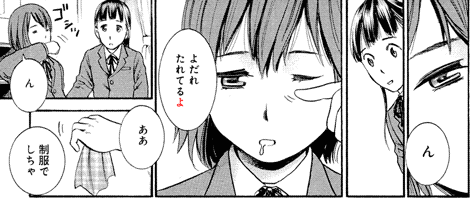
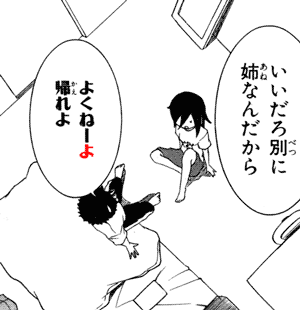
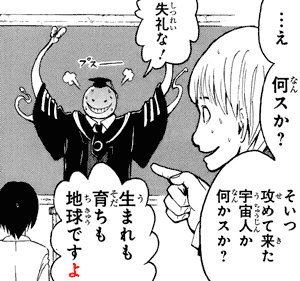
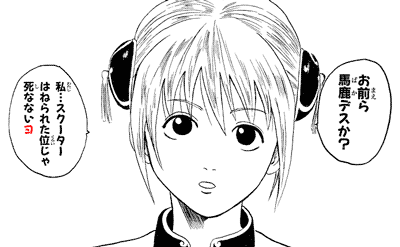
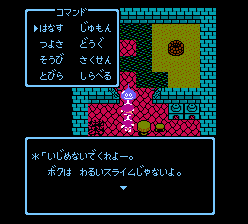
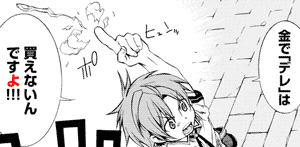
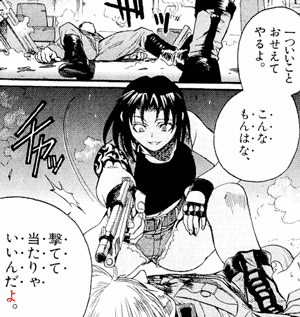
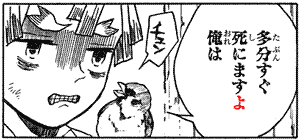
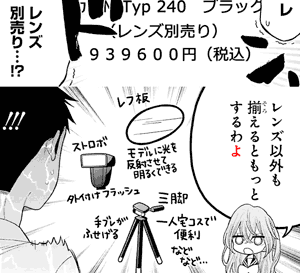
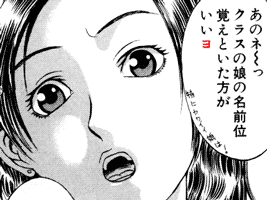
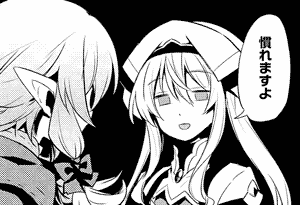
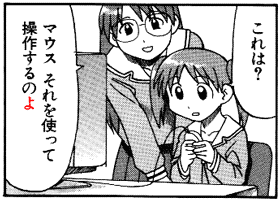
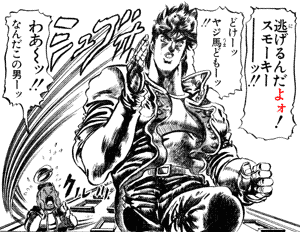
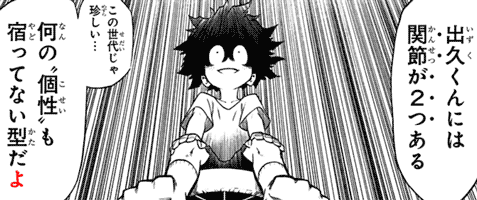
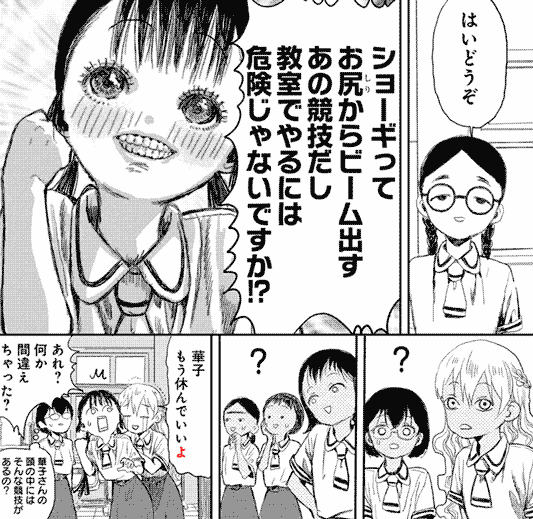
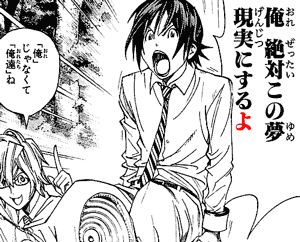
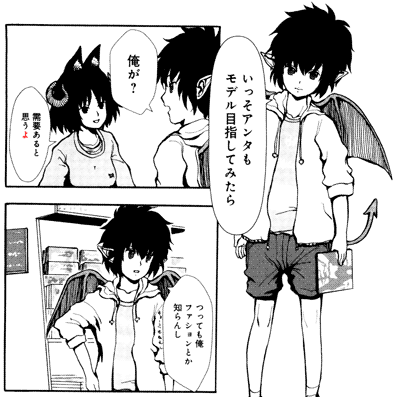
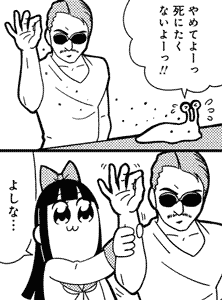
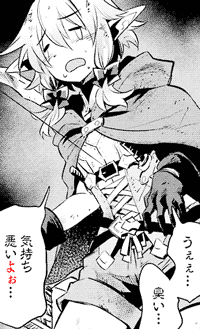
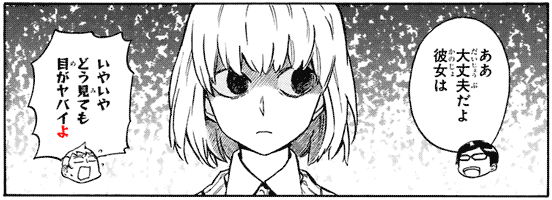
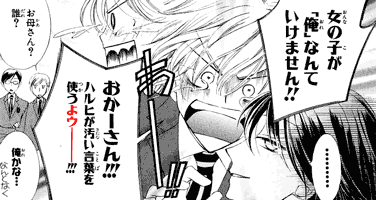
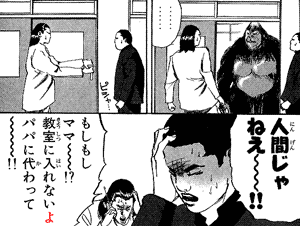
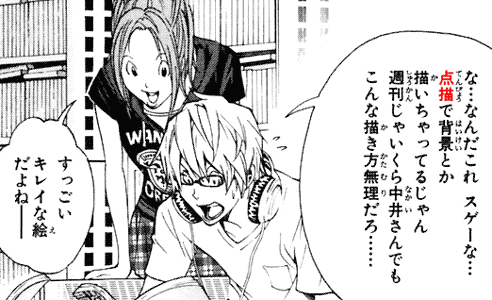
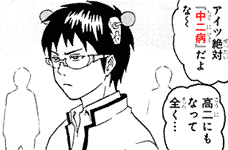
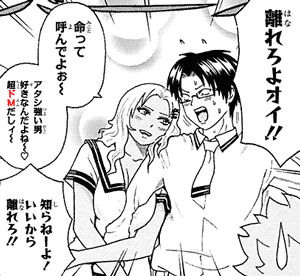
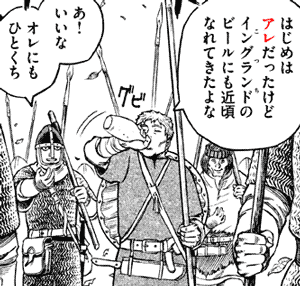
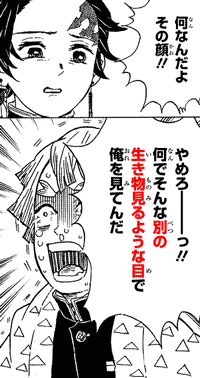
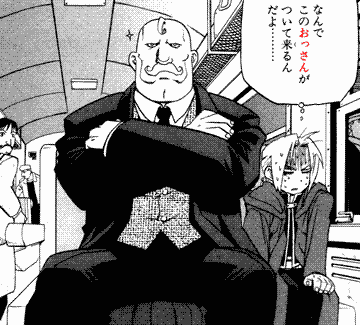
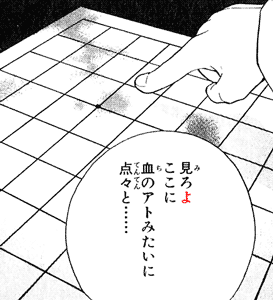
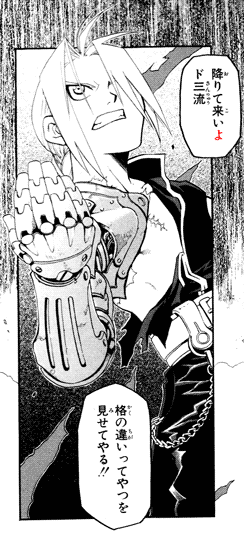
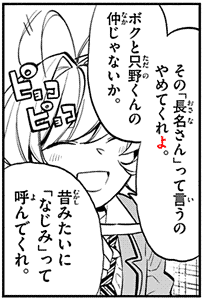
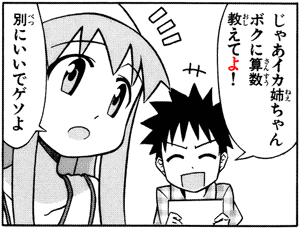
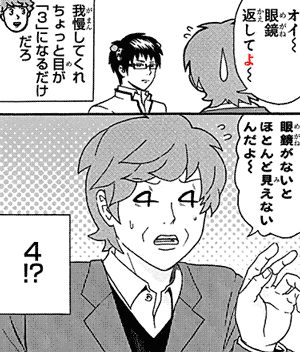
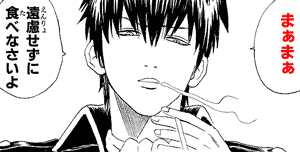

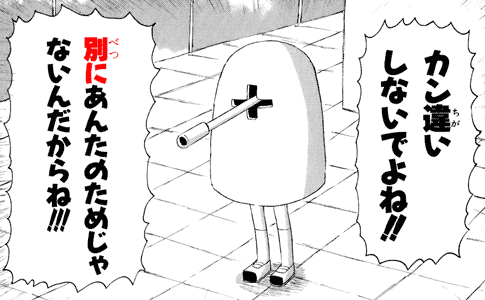
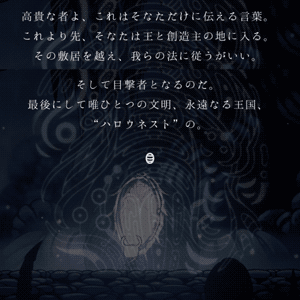
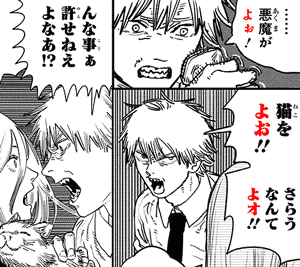
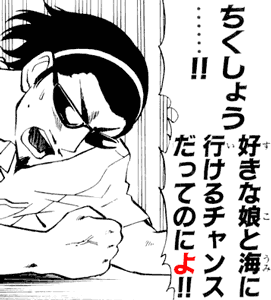
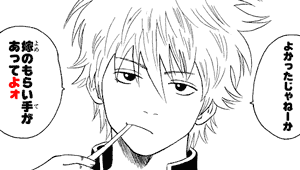
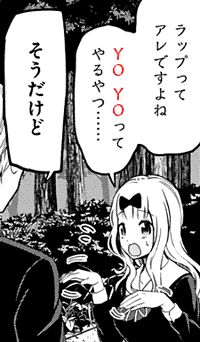
No comments: